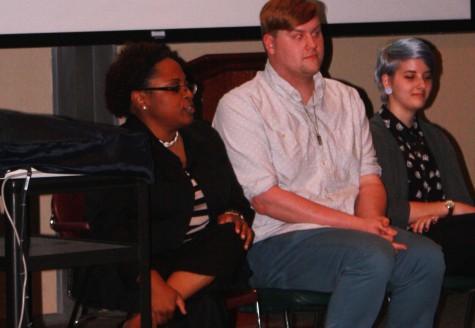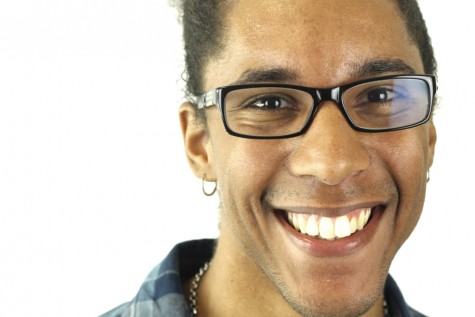LGBT representers speak on personal stories
April 3, 2015
He came out to his mother at 1 a.m. after a night with friends; however, two weeks prior, JoshDoniek, an Eastern graduate, said he came out to himself and his friends.

Gateway Program’s academic advisor, Yolanda Williams, Eastern alumni Josh Doleiu, and Ashlee Bell, sociology major, share their ‘coming out’ story during The Big Gay Panel in Buzzard Hall auditorium.
He said it came as no surprise when he came out to his mother.
“Mom, I’m gay,” he said. “Duh,” she replied. “I’ve known since you were five.”
His story was one of many during Pride’s Big Gay Panel, which featured individuals on campus representing letters of the acronym including Lesbian, Gay, Bisexual, Transgender, Queer, Pansexual, Asexual and Ally Thursday evening.
Doniek said his family was supportive of him after he came out, and like others on the spectrum, he worried about rejection from family members and being forced out of his home.
Shelby Niehaus, a sophomore English major, seemed to take a less serious and more comical approach to coming out. She told her family just before leaving for work to allow them time to think about her sexual orientation; however, Niehaus’ plan backfired because they took it as a joke.
Niehaus identifies as queer and pansexual. Someone who is pansexual is emotionally, physically, romantically, sexually or spiritually attracted to all gender identities and expressions.
Niehaus said because of the manner in which she told her family, they thought she was just being funny, so when the topic came up two weeks later, they had no idea what she was talking about. Her mother even laughed, and that scared her.
“That laugh could have meant she was about to get scary and kick me out,” Niehaus said.
Ky Martin, a freshman graphic design major, identifies as non-binary and does not feel linked to any gender-specific terms or pronouns.
Martin’s roommate did not take this declaration of personal identification seriously, so she rejected Martin and the two did not get along. The issues between the two got so deep that Martin did not feel comfortable living with the roommate and Martin received a new room assignment.
Martin also identifies as T for transgender on the spectrum.
“People would tell me that I am less trans because I sit in the middle,” Martin said.
Members of the audience seemed interested in what each panelist identified as, even asking questions about their personal lives. One of the questions was raised regarding losing or gaining friends for being out and open.
Doniek, said he did not lose any friends when he came out, but some did treat him differently. He recalled a time when the subject of teachers not dating students came up in class. Doniek said the discussion took a turn when gay marriage came up, which led to a comment on adults marrying children as a joke.
“I felt completely disrespected, but I was like, (you’re) dead to me,” Doniek said.
The student who made the comment knew Doniek and what his orientation was.
Some in the crowd wanted to know how the panelists dealt with the intersectionality of being LGBT and African-American, or LGBT and an instructor.
Yolanda Williams, a Gateway advisor, said she cannot separate the fact that she is a lesbian and that she is black.
Williams said people can either be her friend and accept all of her or not; she said whenever she decides to move on with her career, her next location will have to be chosen carefully because it must accept her for who she is.
The issue of how LGBT people are portrayed in media was another topic the panel discussed; the panelists had different views in terms of image, stereotype and tokenism.
Williams said when she was younger and would watch TV, characters who were LGBT were usually blonde women or flamboyant men.
Therefore, when Williams saw a recent episode of “Scandal” that featured two older lesbians who were black, she was glad to see that change in media.
Daniek, who said he represents the flamboyant side of gay males in the media, said that representation is a good and bad thing to have. He said he is accounted for in movies and TV, but it would be nice to have all letters of the acronym represented.
Within the gay community, body image is also something shown and heavily discussed in terms of men being physically fit.
“You’re not going to see me at the gym five times a day—I’m busy, I like pizza,” Doniek said.
Roberto Hodge can be reached at 581-2812 or at [email protected].

















































